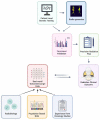Moving the Needle Forward in Genomically-Guided Precision Radiation Treatment
- PMID: 38001574
- PMCID: PMC10669735
- DOI: 10.3390/cancers15225314
Moving the Needle Forward in Genomically-Guided Precision Radiation Treatment
Abstract
Radiation treatment (RT) is a mainstay treatment for many types of cancer. Recommendations for RT and the radiation plan are individualized to each patient, taking into consideration the patient's tumor pathology, staging, anatomy, and other clinical characteristics. Information on germline mutations and somatic tumor mutations is at present rarely used to guide specific clinical decisions in RT. Many genes, such as ATM, and BRCA1/2, have been identified in the laboratory to confer radiation sensitivity. However, our understanding of the clinical significance of mutations in these genes remains limited and, as individual mutations in such genes can be rare, their impact on tumor response and toxicity remains unclear. Current guidelines, including those from the National Comprehensive Cancer Network (NCCN), provide limited guidance on how genetic results should be integrated into RT recommendations. With an increasing understanding of the molecular underpinning of radiation response, genomically-guided RT can inform decisions surrounding RT dose, volume, concurrent therapies, and even omission to further improve oncologic outcomes and reduce risks of toxicities. Here, we review existing evidence from laboratory, pre-clinical, and clinical studies with regard to how genetic alterations may affect radiosensitivity. We also summarize recent data from clinical trials and explore potential future directions to utilize genetic data to support clinical decision-making in developing a pathway toward personalized RT.
Keywords: DNA; cancer; genes; germline; mutations; oncology; radiation sensitivity; radiation treatment; radiogenomics.
Conflict of interest statement
The authors declare no conflict of interest.
Figures



Similar articles
-
The future of Cochrane Neonatal.Early Hum Dev. 2020 Nov;150:105191. doi: 10.1016/j.earlhumdev.2020.105191. Epub 2020 Sep 12. Early Hum Dev. 2020. PMID: 33036834
-
Germline genetic biomarkers to stratify patients for personalized radiation treatment.J Transl Med. 2022 Aug 12;20(1):360. doi: 10.1186/s12967-022-03561-x. J Transl Med. 2022. PMID: 35962345 Free PMC article.
-
ATM mutations in female breast cancer patients predict for an increase in radiation-induced late effects.Int J Radiat Oncol Biol Phys. 2002 Mar 1;52(3):606-13. doi: 10.1016/s0360-3016(01)02684-0. Int J Radiat Oncol Biol Phys. 2002. PMID: 11849780
-
Machine Learning and Radiogenomics: Lessons Learned and Future Directions.Front Oncol. 2018 Jun 21;8:228. doi: 10.3389/fonc.2018.00228. eCollection 2018. Front Oncol. 2018. PMID: 29977864 Free PMC article. Review.
-
Radiation Therapy for Endometrial Cancer: An American Society for Radiation Oncology Clinical Practice Guideline.Pract Radiat Oncol. 2023 Jan-Feb;13(1):41-65. doi: 10.1016/j.prro.2022.09.002. Epub 2022 Oct 22. Pract Radiat Oncol. 2023. PMID: 36280107
References
Publication types
Grants and funding
LinkOut - more resources
Full Text Sources
Research Materials
Miscellaneous

